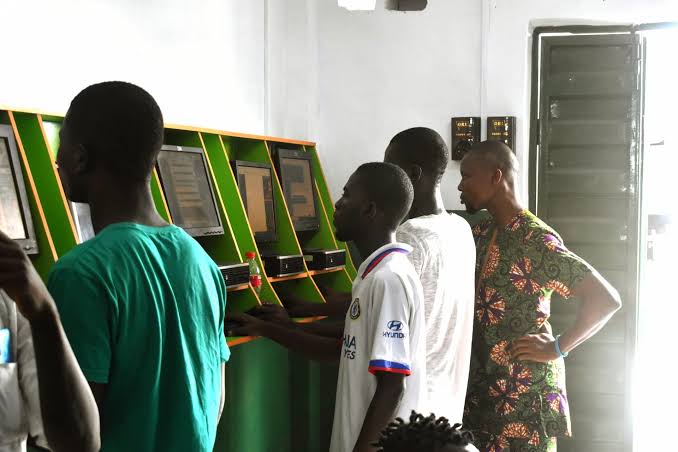Nigeria’s gambling industry is said to be generating significant revenue. Even with this, concerns are growing over its long-term social and economic impact on the nation’s youth.
The Lancet, a weekly peer-reviewed general medical journal, in a report warns that gambling has become a significant public health threat worldwide, fuelled by mobile and online access.
With over 450 million people affected, including 80 million with gambling disorders, experts urge stricter regulations akin to those for tobacco and alcohol.
A report by Statista, a global data and business intelligence platform, suggests nearly 60 million Nigerians, primarily aged between 18 and 40, engage in betting activities regularly.
A recent study of the Nigerian general population found that 36 per cent of adult respondents had gambled and 53 per cent of these people were daily gamblers.
We know that many Nigerians view gambling as a harmless leisure activity, but studies indicate that only a small fraction of gamblers make consistent winnings, while the vast majority experience financial losses.
Gambling has always existed in Nigeria, but in the past, it was viewed as an antisocial activity and was actively discouraged by the church, which warned against the quest for quick wealth.
We recall that in the late 1990s, in Chapter 22, section 236 of the Criminal Code Act, the federal government legalised certain forms of gambling in an attempt to generate tax revenues.
The law distinguishes between games of skill (which are legal) and games of chance (which are illegal). Legal forms of gambling include the lottery, land-based casinos and sports betting, whereas roulette, dice games and non-skilled card games are considered illegal.
Sadly, this has made gambling more acceptable to the public, especially to the underaged. We recognise that the most popular forms of gambling in the country, presently, are online sports betting (e.g.football league promotions and the pools), the lottery and slot machines.
It has been argued that monetary gain, fuelled by greed, unemployment, economic hardship and poverty are the most potent motivating factors for gambling and may act as a spring board to fuel criminality.
We are worried that gambling is weakening the nation’s youth’s attitude toward hard work, and the federal government should be doing something about it.
Nigeria’s betting industry is one of the largest in Africa, with an estimated market value exceeding $2 billion in 2023.
At more than N3 trillion and rising, Nigeria’s sports betting industry has witnessed an unprecedented boom in recent years, fuelled by economic hardship, widespread youth unemployment, and the accessibility of mobile technology.
With betting shops on nearly every street and mobile platforms allowing easy wagers, many young Nigerians have turned to gambling as a means of survival or escape.
We are not ignorant of the fact that the major driver of the betting boom is the country’s economic situation.
According to the National Bureau of Statistics (NBS), Nigeria’s youth unemployment rate remains alarmingly high, pushing many young people into desperate measures to make ends meet.
With limited job prospects, a lot of young people see sports betting as an investment rather than a gamble.
The industry is estimated to be worth over N3 trillion annually, with major brands aggressively marketing their services through social media, sponsorships, and celebrity endorsements.
This underscores a recent Lancet report, which highlights sophisticated marketing and easy 24/7 access, particularly impacting youth, linking gambling to mental health issues, financial ruin, and social harms.
For us, the long-term economic consequences of widespread betting among young Nigerians are concerning.
The psychological effects of gambling addiction are also alarming, as mental health experts warn that the rise in gambling habits among young Nigerians is leading to increased cases of anxiety, depression, and even suicidal tendencies.
Experts insist that when young people lose money in bets, it affects their self-esteem and mental well-being, while many become obsessed with winning back their losses, which can spiral into a dangerous addiction.
Rather than invest in productive ventures, many are spending their limited resources on bets, reducing overall economic productivity.
While these betting companies argue that they provide entertainment and employment opportunities, we believe that they exploit the financial vulnerability of young Nigerians.
There’s no doubt that the industry needs stricter regulations and betting companies should be mandated to promote responsible gambling and set limits on deposits and losses.
Although the National Lottery Regulatory Commission (NLRC) oversees sports betting, enforcement of gambling laws is inconsistent.
Countries like the United Kingdom (UK) have implemented stringent measures, including advertising restrictions and deposit limits, to curb addiction.
We urge the nation to benefit from similar policies to protect its youth from the potential harms of unchecked gambling.
Now that the regulation of gambling is under the purview of states, going by the ruling of the Supreme Court, state governments should consider this a wake-up call to regulate their youth’s involvement in this game of chance.
In our opinion, to address this growing issue, the state governments must take proactive measures.
Even though Nigeria continues to be faced with rising unemployment and economic challenges, ensuring that sports betting does not become a widespread societal crisis should be a priority.
We know that stricter regulations, public awareness campaigns on the risks of gambling, and increased job creation initiatives can help redirect youth engagement towards more sustainable economic activities.
While sports betting is unlikely to disappear, it is crucial to strike a balance between industry growth and societal well-being.
Without urgent interventions, the allure of easy money may continue to take a heavy toll on Nigeria’s youth, with lasting consequences for the country’s future.





